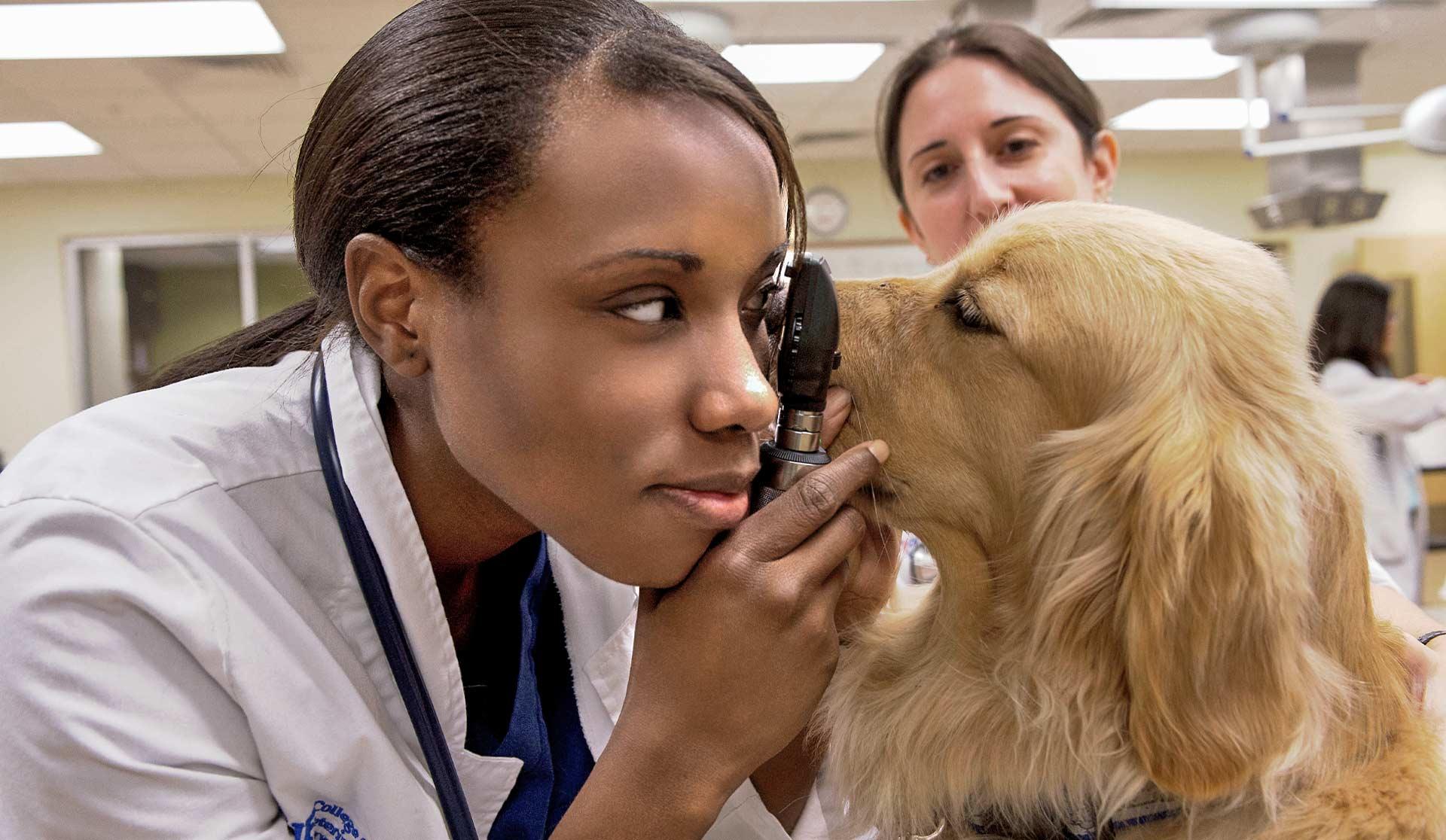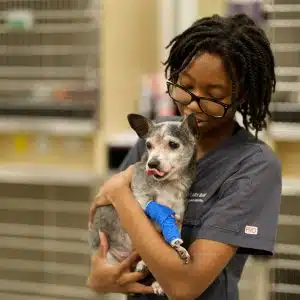How to prepare ahead of working with a Board Certified Veterinary Oncologist
Wiki Article
Comprehensive Guide to the Services Supplied by a Veterinary Oncologist
Veterinary oncology incorporates a broad array of services targeted at detecting and treating cancer in pet dogs. Veterinary Cancer Specialist. Oncologists utilize innovative analysis strategies and supply different treatment alternatives tailored to every pet's demands. They likewise focus on helpful treatment and offer beneficial resources for animal proprietors. Recognizing these services is vital for making educated decisions. What certain elements of vet oncology can significantly impact an animal's treatment journey?Recognizing Veterinary Oncology
Vet oncology is a customized field concentrated on dealing with and detecting cancer cells in pets. This technique incorporates a variety of techniques, from clinical therapies such as chemotherapy and immunotherapy to surgical treatments aimed at eliminating tumors. Vet oncologists are educated to recognize the distinct symptoms of cancer cells in numerous types, enabling them to customize treatment strategies to private people.In addition to standard treatments, vet oncology emphasizes supportive care, which plays a crucial role in enhancing the high quality of life for afflicted pets. This consists of discomfort management, nutritional support, and palliative care options. Collaboration with animal owners is critical, as they are integral to decision-making regarding their pets' treatment courses. As study advancements, veterinary oncology continues to develop, providing new hope and improved outcomes for animals diagnosed with cancer. Overall, this area is basic for resolving the complexities of cancer in buddy animals.
Advanced Diagnostic Techniques
Advanced analysis strategies play a crucial duty in vet oncology, giving important understandings into the presence and level of cancer cells in animals. Imaging modalities such as ultrasound, CT scans, and MRI are commonly used to visualize lumps and examine their characteristics. In addition, biopsy treatments are very important for acquiring tissue examples, permitting for conclusive diagnosis and customized treatment strategies.Imaging Modalities Utilized
Imaging techniques play a vital duty in the medical diagnosis and administration of cancer cells in animals. Vet oncologists use various advanced imaging techniques to examine tumor visibility, size, and transition. Radiography, or X-rays, uses a preliminary sight of bone and chest problems, while ultrasound offers real-time imaging of soft cells, permitting in-depth examination of internal organs. Calculated tomography (CT) enhances visualization of complicated physiological structures and allows 3D reconstructions, assisting in precise growth localization. Magnetic vibration imaging (MRI) is very useful for soft tissue distinction, specifically in brain growths. In addition, nuclear medication techniques such as positron discharge tomography (PET DOG) help determine metabolic task within lumps. Jointly, these methods enhance diagnostic precision, leading effective treatment techniques for oncological people.Biopsy Procedures Described
Adhering to the first assessment through imaging methods, obtaining a clear-cut diagnosis commonly requires tissue sampling through biopsy procedures. Veterinary oncologists use different biopsy methods based on the growth's place and attributes. Great needle desire (FNA) is a minimally intrusive technique that removes cells for cytological exam, perfect for surface masses. Core needle biopsies give bigger cells samples and are beneficial for much deeper growths, enabling for histopathological analysis. Surgical biopsies involve excising a portion or the whole lump, facilitating complete examination. These procedures not only confirm the existence of cancer but likewise aid establish its kind and quality, directing treatment decisions. Each biopsy method is selected carefully to stabilize analysis accuracy with client safety and security and convenience.Therapy Options for Cancer in Pet dogs
When an animal is diagnosed with cancer cells, a variety of therapy options become readily available to assist enhance and take care of the illness quality of life. Vet oncologists generally advise a multidisciplinary method customized to the individual family pet's needs, which might consist of surgical treatment, radiation treatment, immunotherapy, or alternative treatments.Surgery is usually used to remove lumps and damaged cells, possibly bring about complete remission in some instances. Radiation treatment aims to target and ruin cancer cells, decreasing tumor size and relieving symptoms - Board Certified Veterinary Oncologist. Immunotherapy takes advantage of the pet's immune system to combat cancer cells extra effectively, while alternate treatments may consist of acupuncture or herbal supplements to support general health and wellness
Each therapy alternative carries its own benefits and dangers, and veterinary oncologists work carefully with pet owners to make a thorough strategy that aligns with the pet's particular diagnosis and the proprietor's dreams. The ultimate objective is to improve the pet dog's convenience and top quality of life throughout their cancer cells trip.
Radiation treatment for Pets
Radiation treatment is an usual therapy choice for family pets detected with cancer cells and is frequently used along with other treatments described by veterinary oncologists. This treatment involves the administration of details medicines made to target and damage cancer cells, therefore lowering lump dimension and avoiding the spread of the disease. Vet oncologists customize radiation treatment procedures based on the type of cancer cells, the family pet's general health, and the desired therapy result.Negative effects can occur, as these medicines might also influence healthy cells. Common responses include nausea, throwing up, and momentary adjustments in hunger - Veterinary Oncologist. Vet oncologists are furnished to manage these negative effects efficiently, guaranteeing the pet's convenience throughout the treatment procedure. Regular tracking through blood examinations and follow-up visits is necessary to analyze the animal's feedback to chemotherapy and make essential modifications. Ultimately, you could check here chemotherapy can give considerable advantages, improving the top quality of life for pets encountering cancer cells diagnoses

Radiation Therapy in Veterinary Medication
Radiation therapy serves as a reliable therapy choice for animals diagnosed with local lumps, providing a targeted approach to cancer cells administration. This method utilizes high-energy radiation to damage the DNA of cancer cells, hindering their capability to proliferate. It is especially useful for tumors that are not amenable to medical removal or for instances helpful hints where surgery might not be possible due to the tumor's place.Veterinary oncologists customize radiation procedures based upon growth type, area, and size, along with the family pet's overall health and wellness. Treatment can be provided using external light beam radiation or brachytherapy, each with distinct advantages. Generally, numerous sessions are required to make best use of efficiency while decreasing side effects.
Although pet dogs may experience momentary responses such as skin irritation, the general purpose is to shrink tumors and ease symptoms, eventually boosting the pet dog's prognosis and high quality of life. As necessary, radiation treatment plays an important function in detailed cancer cells care.
Palliative Care and High Quality of Life
Palliative care in vet oncology concentrates on improving the lifestyle for family pets encountering incurable illnesses, ensuring comfort and dignity in their last days. This customized strategy prioritizes discomfort management, symptom control, and emotional assistance. Vet oncologists examine each family pet's private needs, tailoring interventions to ease pain and improve overall wellness.Methods might consist of providing medications for pain alleviation, handling nausea, and dealing with other traumatic signs. Furthermore, nutritional support is typically offered to preserve strength and enhance cravings. The emotional element of palliative care is just as important; producing a calm atmosphere helps lower anxiousness for both family pet and owner.
Inevitably, the goal of palliative treatment is to enable animals to enjoy their continuing to be time with as much delight and self-respect as possible. By concentrating on comfort and quality of life, vet oncologists play a crucial duty in making sure that animals and their family members navigate this tough journey with empathy and understanding.
Support for Family Pet Owners During Treatment

Emotional Advice for Owners
Charting the psychological landscape during a family pet's cancer therapy can be an overwhelming experience for proprietors. The uncertainty bordering diagnosis and diagnosis can result in feelings of despair, anxiety, and vulnerability. Veterinary oncologists recognize the value of psychological support and often supply advice to help owners browse this tough journey. Communication is necessary; discussing treatment alternatives and possible outcomes can ease some anxieties. Furthermore, providing reassurance that emotional feedbacks are valid fosters a helpful setting. Numerous oncology facilities may also suggest assistance teams or therapy services customized for pet dog proprietors, helping with common experiences. Motivating proprietors to focus on self-care throughout this time around is essential, as their psychological well-being directly influences their pet's comfort and overall treatment experience.
Resources and Educational Products
Guiding with the complexities of an animal's cancer therapy can be frightening for proprietors, making access to educational products and trustworthy sources essential. Vet oncologists commonly supply a range of handouts, brochures, and online products that clarify treatment alternatives, prospective negative effects, and treatment approaches. These resources help equip and debunk the process pet dog owners Veterinary Cancer Specialist to make informed choices. Additionally, numerous oncology clinics supply access to sustain groups and forums where proprietors can attach with others dealing with comparable difficulties, fostering a sense of area. Educational webinars and workshops carried out by veterinary experts additionally enhance understanding, making certain that proprietors are well-appointed to navigate their pet dog's journey via cancer therapy with confidence and expertise.Frequently Asked Concerns
How Can I Prepare My Family Pet for a Vet Oncology Go To?
Preparing a pet for a veterinary oncology go to entails gathering clinical records, keeping in mind symptoms, and making sure the pet dog fits. A calm temperament and familiar items can assist reduce anxiety during the consultation.What Are the Indications My Family Pet May Have Cancer Cells?
Signs that an animal may have cancer cells consist of unexplained weight management, persistent vomiting or diarrhea, unusual swellings or swellings, sleepiness, adjustments in cravings, difficulty breathing, and alterations in habits. Trigger vet focus is essential.How Can I Support My Animal Mentally Throughout Treatment?
Supporting a family pet psychologically throughout therapy entails giving convenience, keeping regimens, offering gentle affection, and ensuring a tranquil atmosphere. Taking part in peaceful play and routine companionship aids relieve stress and anxiety and cultivates a feeling of protection.Exist Alternate Therapies for Pet Dogs With Cancer?
Alternative therapies for family pets with cancer cells consist of acupuncture, herbal treatments, and nutritional support. These strategies might match standard therapies, advertising general wellness. Consulting with a veterinarian is crucial for efficient and risk-free integration of different treatments.What Costs Should I Expect for Vet Oncology Services?
The awaited expenses for veterinary oncology solutions can differ substantially, often affected by diagnostics, treatments, and ongoing treatment. Animal proprietors should prepare for costs ranging from examinations to specialized treatments, mirroring the intricacy of cancer administration.Collaboration with pet proprietors is critical, as they are indispensable to decision-making concerning their animals' therapy paths. Each therapy option lugs its own benefits and dangers, and veterinary oncologists work very closely with animal proprietors to develop a comprehensive strategy that aligns with the animal's certain medical diagnosis and the owner's dreams. Animals might experience temporary responses such as skin irritability, the total objective is to reduce tumors and ease symptoms, ultimately enhancing the pet dog's prognosis and top quality of life. Support for pet dog owners during therapy is essential in steering through the emotional challenges connected with a pet dog's cancer cells diagnosis. Preparing a family pet for a vet oncology visit involves celebration medical records, noting signs, and making certain the pet is comfortable.
Report this wiki page